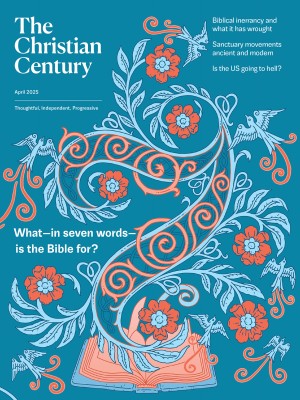April 27, Easter 2C (John 20:19-31)
Why wasn’t Thomas with the others? Why did he eventually return?
For two decades I’ve been leading groups through a 12-week introduction to the biblical narrative using storytelling. Most recently, after the session when we heard the story of the first three kings of Israel, a church member pulled me aside and said, “I’m embarrassed to admit this, but I honestly thought David and Goliath was just a sports analogy. I had no idea it was in the Bible.” I wondered if they might say something similar when we got to the story of Doubting Thomas in the tenth week of the study. Oh, I just thought that was a generic name for a skeptic.
I knew about Thomas from an early age. Growing up in the 1970s in the British version of fundamentalist dispensationalism, I heard about him often as a cautionary tale. While I’m fairly certain the elders of my church could not have named the seven deadly sins, if I’d asked them I suspect they would have included doubt on their list. While not necessarily deadly, doubt was certainly dangerous. The bumper sticker slogan “God said it, I believe it, that settles it” would have been a good fit for our congregation. Every Sunday we were exhorted to “have faith,” to “just believe,” and to be wary should doubts arise, for doubt was the opposite of faith.
Read our latest issue or browse back issues.
I left that church when I came to the United States more than 30 years ago. I was already leaving their theology before I boarded the plane. In time, I would come to believe that the opposite of faith is not doubt but certainty. A friend introduced me to the writings of Frederick Buechner, and when I read, in Wishful Thinking, “Doubts are the ants in the pants of faith. They keep it awake and moving,” any residual guilt that remained for my ongoing questioning of the version of the Christian faith I first experienced drifted away. For the certainty that I was told revealed a strong faith—and strong people—had come to feel fragile, as it had little to offer the pain and suffering I witnessed in others. The perennial problem of evil is not solved by doubling down on belief. At least it isn’t for me.
Over the years I’ve had multiple conversations with strangers, who, upon learning what I do for a living, respond, “Oh, I don’t believe in God.” My younger self would have leapt at this chance to engage in some apologetics. My older self usually responds, “Tell me about this God you don’t believe in, because I probably don’t believe in that God either.” If the conversation continues, I might discover that the person grew up in a church similar to mine and at some point rejected the certainty of that faith, along with the judgmentalism and self-righteousness that often accompany it. Or I might learn that they’ve been on the receiving end of such judgment and want nothing to do with the God in whose name the person pronounced that judgment. If the conversation ventures into vulnerable territory, I’ll hear stories of profound wounding at the hands of individuals and institutions. I’ll hear that someone they loved and respected in their church had let them down in ways they couldn’t believe possible. And, sometimes, that they had been the one to do the letting down—and had lost faith not in God but in themselves.
I wonder if we’d had the chance to sit down with Thomas, before he returned to the house where the disciples were fearfully gathered behind locked doors, which kind of story he would tell. Why wasn’t he with the others? Why did he eventually return? Why did he say he would need to thrust his hand into Jesus’ side before he would believe their declaration that, “We have seen the Lord!” What was the source of his doubt? Perhaps he had lost faith in Jesus. How could he be who he said he was and then allow himself to be killed? Perhaps Thomas had lost faith in himself. After all, he had once declared that he was willing to return to Judaea with Jesus and die with him there. But just a few days ago he had abandoned Jesus when the council made good on their threat. Maybe it was some combination of both.
Whatever the reason, remembering him as Doubting Thomas feels quite unfair. Not just because one inglorious moment should not outweigh all the other moments of a person’s life, but because Thomas’s encounter with the risen Jesus brings John’s Gospel full circle. “In the beginning was the Word, and the Word was with God, and the Word was God,” says the book’s prologue (1:1). “And the Word became flesh, and dwelt among us” (1:14). Later it is Thomas who makes the declaration we’ve been waiting the length of the book to hear someone make: “My Lord, and my God!”
John tells us that he has written these words that we, too, may come to believe. Our own doubts might just be a natural and essential part of that journey.






